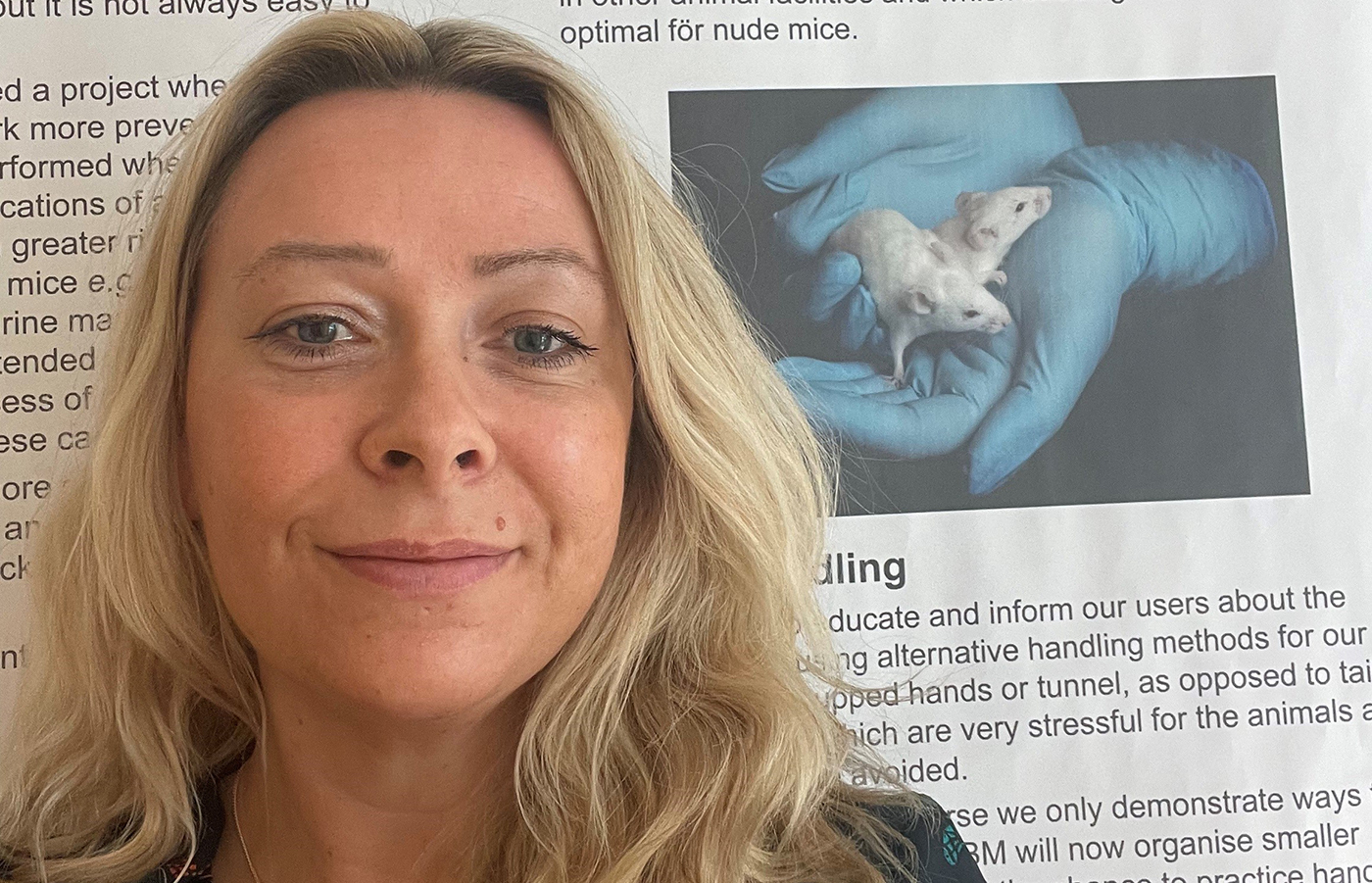- Startsida
- Languages
- English
- Swedish Board of Agriculture
- Animals
- The Swedish 3Rs Center
- News
- The animal technician is the engine to make an animal study run right
Publiceringsdatum5 June 2023
The animal technician is the engine to make an animal study run right
Meet one of our most recent members of the Swedish National Committee for the Protection of Animals used for Scientific Purposes – Sara Barr at the University of Gothenburg.

Since February, Sara Barr from the University of Gothenburg is a new member of the Swedish National Committee for the Protection of Animals used for Scientific Purposes.
Sara, welcome to the National Committee. Who are you?
— Today I am a 3Rs Coordinator and Research administrator at the University of Gothenburg. My background as an animal technician has led me to several working experiences, but I have always come back to the 3Rs and the animal welfare of laboratory animals.
Sara administers the animal welfare body and the local animal welfare groups within the university and in her role as a 3Rs Coordinator she directs many 3Rs projects and is the university’s contact towards the Swedish 3Rs Center. Sara organizes 3R seminars and activities at the university and is the 3Rs specialist in the preparatory meeting before an ethical application.
Sara has a background as a trained animal technician with a Master’s Degree in Conservation Biology at Lund University. During her many years as an animal technician at AstraZeneca, she worked to establish a strong 3Rs culture in the Swedish organisation together with colleagues mainly from the UK and the US. For some time, Sara was also Curator of an animal department at a wildlife park in the west of Sweden, called Nordens Ark.
A couple of years ago, Sara returned to the University of Gothenburg to start a new position as the 3Rs Coordinator. Sara also represents the university in the Gothenburg Regional Ethics Committee on Animal Experiments.
What can you say about the animal technician’s role in research?
— The animal technician is the extension of the eyes and the ears of the researchers and the veterinarians, says Sara. With the daily care and supervision of the animals, the technicians are the best resource for the animal’s wellbeing, and provide important support within an animal study.
Sara defines it like a trinity alliance for animal welfare that consists of the technician, the veterinarian and the researcher. The best way to make this alliance work is to collaborate and listen to each other.
Another important factor for the animal technician, is competence training and to meet other technicians, which is a dedicated task for the 3Rs Center, supported by the National Committee. The Center shall be an information hub and an excellence centre, for technicians in Sweden to turn to, to get relevant information as well as education and training.
— We must offer all animal technicians in Sweden continuous training and new competences, for example by arranging webinars, practical education and networks. We must keep up the good work, for example the annual technician’s week and the national meeting for all technicians, says Sara.
Sara explains how sharing with others can boost the individual technician. By interacting with other technicians, sharing knowledge and experience, one develops in the role. The technicians will also bring important new knowledge back to their organisation.
Sara mentions areas such as compassion fatigue, communication and different techniques as important competences for the technicians. Just recently, a pilot of an exchange program was presented by two committed animal technicians in Denmark and Sweden, at the Scand-LAS conference in Uppsala.
— A great initiative, that should be used further, says Sara. I like the idea to let technicians share and learn from others by visiting another workplace. But I think it is important that it would be a mutual exchange that goes both ways and for a longer time than the pilot lasted.
To create a certain culture in a workplace, such as culture of care, can be demanding – what are your experiences?
— All leaders must truly understand the importance of a culture of care, if they want to hire and keep personnel committed to growth and progress, says Sara. In such a culture, the staff is safe to raise issues at their workplace. For example, within animal welfare it is often the animal technician that has ideas for improvements.
In a culture of care, he or she is encouraged by a supporting manager, an attentive researcher and an active animal welfare body, and do not hesitate to share an idea or an issue.
What is your vision as a member of the Swedish National Committee?
Sara has a fundamental understanding and knowledge when it comes to the animal technician’s role, which is a valuable addition to the committee’s expertise. She also represents the University of Gothenburg in the National Committee, which she means is important.
— We all have different perspectives and come with different backgrounds in the National Committee, but we share the same goals. The 3Rs Center is today an increasingly established national hub and we must take care of that trust.
Senast uppdaterad: